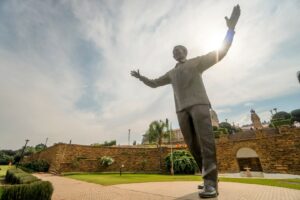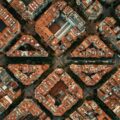The Dutch Reformed Church and its contribution to Apartheid
The Dutch Reformed Church and its contribution to Apartheid
The Apartheid system in South Africa was not only supported within politics but within religious circles as well.
Is everyone equal in God’s eyes?
In 1994, the first democratic elections took place in South Africa, in which all races were finally able to vote. Afterwards, Nelson Mandela was inaugurated as president, marking a symbolic end to Apartheid.[1] Apartheid is an Afrikaans word and means apart-hood or ‘the state of being apart’.[2] It was a political system in South Africa which divided people into racial groups and gave black people different economic and political rights than white people.[3]
The National Party became associated with the Apartheid policy by winning the elections in 1948 with the term ‘Apartheid’ as their slogan. Prime Minister Dr D.F. Malan legalised and enforced Apartheid laws. Malan was also a former minister of the Nederduitse Gereformeerde Kerk (NGK), also known as the Dutch Reformed Church (DRC).[4] While many institutions and actors contributed to the system of Apartheid, the role of the Dutch Reformed Church is worth examining from a theological viewpoint. Specifically, how could the DRC justify the Apartheid system from a theological perspective?
Colonial roots
Before diving into theological questions, a brief background of the role of the DRC will help provide a clearer context. In 1652, Dutch settlers arrived at the Cape Colony and brought their reformed beliefs with them.[5] The Dutch East India Company was promoting Reformed Christianity and even prohibited other denominations from having church services. Thus, they had a religious monopoly for several decades.[6] In 1795, the British won sovereignty over the colony and brought several English churches, such as the Anglican Church, the Methodist Church, and the Presbyterian Church.[7] According to statistics from 1994, about 75% of the South African population was Christian.[8]
At the end of the 18th century, the Dutch Reformed Church put more emphasis on missionary work again. The Dutch colonists, however, were afraid that by focusing more on missions, there would be ‘gelykstelling’ (races would become equal).[9] In 1824, the DRC in South Africa became autonomous from the Reformed Church in the Netherlands. Questions about whether races should be mixed during services arose, leading to a decision by the synod of the DRC in November 1857. This statement ensured that it is certainly desirable and scriptural that “members out of the heathendom,” meaning the African people, should be accepted within the congregation. However, exceptions were allowed when white members of the Church preferred so. Eventually, this exception became the norm.[10] In 1921, the DRC started an official study on the question of race. The term used was the ‘native problem’. In a conference of the DR churches, segregation was supported, but it was called ‘separate development’ and supposedly would be beneficial to all.[11]
What happened when voices against Apartheid began to arise within the country? In the 1970s and 1980s, Apartheid was called into question around the country, but the leaders of the DRC were more devoted to Apartheid than their followers. The church became a blockage against political reform.[12] However, there were a few clergy within the DRC that opposed Apartheid. The most well-known is Reverent Beyers-Naude, who left his whites-only church in the 70s and joined a Black parish within the DRC.[13]
What does the Bible say?
One of the big questions following on from the DRC support of Apartheid was about how justification was found within the scriptures. An explanation was given by Totius, who was a well-known Afrikaner poet and who worked as a Bible translator for the Reformed Churches. He gave a speech on the National Congress on the Race Policy of the Afrikaner in 1944, which began with:
‘“Give me a Bible text,” says the opponent of our colour policy, “a text that shows that segregation agrees with the judgment of Holy Scripture …. I answer, “There is no proof
I don’t have a text, but I have the Bible, … the whole Bible. My argumentation would proceed from Genesis to Revelation.”’[14]
He envisioned God as the Great Separator, because in the Bible God is separating light from darkness, the dry land from the waters, et cetera. The same rationale is used for people. According to Totius, people should not put together what God has separated. He also argues that whenever the word ‘unity’ is used in the Bible, it is meant as a spiritual unity in Christ instead of a literal unity of people.[15] Another argument made by Totius involves the idea of Christian guardianship. According to him, it is a calling from God to “guide the native in his coming of age” and to “be bearers of light where the darkness still prevails.” Such scriptural justifications shared in the 1944 congress were then spread to a wider public.[16]
Has the church repented?
After being a key actor in upholding the Apartheid system, the DRC acknowledged their role in the matter and wanted to help rebuild South Africa. In 1986, Nelis van Rensburg, the Church’s national moderator, said, “We were very much complicit [in propping up [A]partheid]. We provided the theological base for [A]partheid. And that’s how ideology works.”[17] He also said the Church will continue to repent for its sins for as long as necessary, and will also try to put its words to action.[18] Furthermore, the synod delegates stated that the system of Apartheid goes against brotherly love and justice and that it affects the human dignity.[19]
Altogether, the Dutch Reformed Church supported and upheld the system of Apartheid in South Africa for a long time. They saw the light, but can what was broken ever be repaired?
Our team of analysts conducts research on topics relating to religion and society. In the past month, the topics of traditions, tension, and leadership were trending. Find out their relationships on the EARS Dashboard.
Sources
[1] Vosloo, R. (2015). Christianity and apartheid in South Africa. In Routledge Companion to Christianity in Africa (pp. 418-441). Routledge.
[2] Ibid.
[3] Apartheid Definition & Meaning
[4] Ibid.
[5] Corrado, E. (2013). The Godliness of Apartheid Planning: The legitimizing role of the Dutch Reformed Church. MUP Capstone.
[6] Vosloo. Christianity and apartheid in South Africa. 402.
[7] Ibid.
[8] Nelson, J. (2003). The role the dutch reformed church played in the rise and fall of apartheid. Journal of Hate Studies, 2(1), 63–63.
[9] Vosloo. Christianity and apartheid in South Africa. 402.
[10] Ibid.
[11] Ibid.
[12] Nelson, J. The role the dutch reformed church played in the rise and fall of apartheid. Journal of Hate Studies, 63–63.
[13] Ibid.
[14] Vosloo. Christianity and apartheid in South Africa. 407.
[15] Vosloo, R. R. (2015). The Bible and the justification of apartheid in Reformed circles in the 1940’s in South Africa: Some historical, hermeneutical and theological remarks. Stellenbosch Theological Journal, 1(2), 195-215.
[16] Ibid.
[17] NG Kerk is repenting for apartheid – The Mail & Guardian
[18] Ibid.






